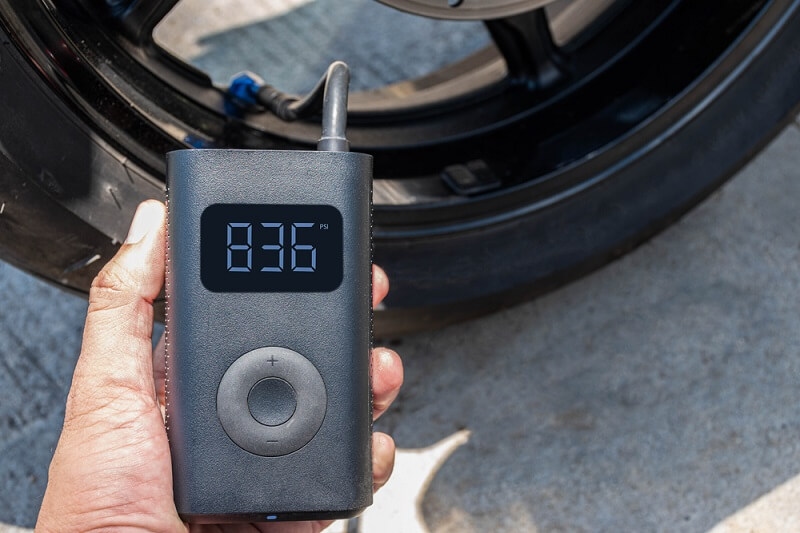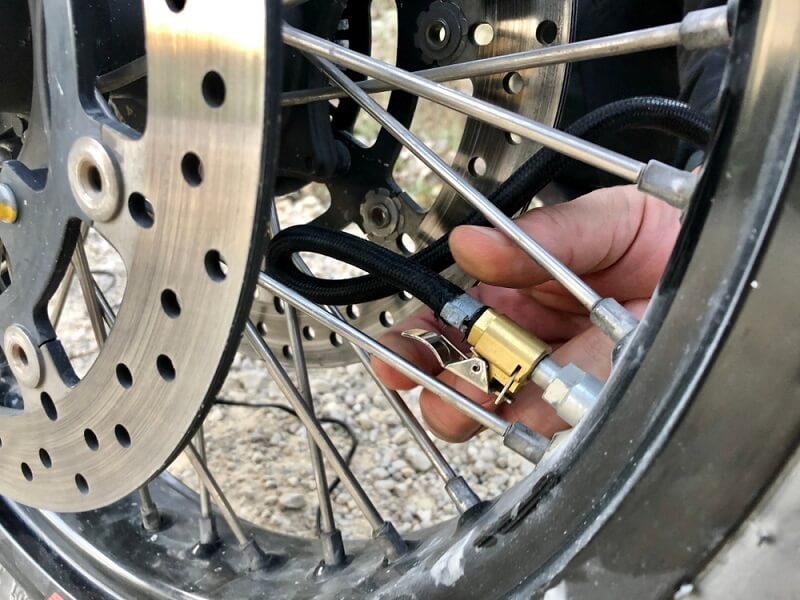
Experienced riders know the importance of properly inflated tires, be it for the mechanical functioning of your bike, to avoid inconveniences, or, more importantly, for safety reasons. Whether you are off-roading in the wilderness for the weekend or cruising around town, inadvertent tire deflation can limit your travels. That's where portable air compressors come in for U.S. riders. These small, portable devices allow for inflation on the go and provide riders another way to tackle low pressure or flats on the road without a full-blown garage to inflate their tires.
In this article, we'll cover the features, pros and cons, types, and factors to consider when selecting a portable air compressor for moto riders in the U.S. We'll look at everything from size, weight, installation, accessories, and more, from a lightweight cordless air inflator you can take anywhere to a serviceable 12V inflator for trips to keep you rolling efficiently—and hopefully safely.
Motorcycles are more likely to have tire pressure problems than cars because their tires have less air volume. A smaller amount of air will cause handling problems and uneven wear, increasing the chances of a blowout. Having proper inflation gives
While many riders still use gas station air pumps, gas stations may not be available, especially if you love riding off the grid. Given this, carrying a motorcycle compressor in your saddlebag or top box is one of the wisest investments if you're preparing for roadside safety.
Container-style air compressors are much more compact, quieter, and require less power than they did previously. Current compressors are light, battery-efficient, and portable with the motorcyclist in mind.
Most air compressors designed for motorcyclists are palm-sized and lightweight (under 2 lbs.). Compact air compressors can be easily stowed in a tank bag or a pannier, and some cordless drivers will fit in a jacket pocket.
When you're many miles from the last local town and you begin to feel your tire get squishy, having a U.S. bike tire inflator allows you to be out there with help.
The terrain often dictates the need to adjust the PSI. A portable inflator will allow you to increase the inflation after longer highway trips, or you may want to decrease it before hitting a gravel road surface to aid in traction and comfort.
Battery-operated units have improved technology, offering 3-4 inflations per full charge. This is helpful for off-road riders and travelers who camp for a while, making it challenging to access vehicle power.
Choosing the correct type of emergency bike inflation gear depends on your riding habits, budget, and preference for power source. Here are the main categories:
Built-in rechargeable lithium batteries power these highly portable models. Many also double as power banks, allowing you to charge your phone in a pinch.
Pros:
Cons:
Example Features: Digital pressure display, preset PSI, auto shut-off, USB charging port
These connect to your motorcycle’s battery or a 12V accessory port. They are highly reliable and great for long-distance riders.
Pros:
Cons:
Ideal for: Touring bikes, adventure riders, riders with USB/12V plugs installed
Some mechanical pumps don’t need electricity—just manual effort. Though slow, they’re helpful as a last resort or for ultralight setups.
Pros:
Cons:
Best for: Ultralight dual-sport setups, cycling/moto crossover gear

Not all compact inflators are created equal. When browsing through cordless air pump review USA results or shopping at your local motorcycle outfitter, look for these essential features:
Ensure the compressor can reach the PSI range required by your tires (typically 28–42 PSI for most motorcycles). A digital gauge with +/- 1 PSI accuracy is ideal.
Higher flow rate = faster inflation. Look for units inflating a standard motorcycle tire (120/70-17 or similar) in under 4 minutes.
If you ride in rough terrain or varying weather, your compact motorcycle compressor must be rugged, water-resistant, and vibration-tolerant.
A must-have feature for nighttime emergencies or roadside fixes in low-light conditions.
Push-button operation, auto-stop at target PSI, and a clear digital display make life easier, especially with gloves on.
U.S. roads offer diverse riding environments—from rocky trails in the West to pothole-riddled urban streets in the East. Here’s how a portable air compressor motor can serve different rider profiles:
You may be 100 miles from the nearest gas station, and tire pressure can fluctuate with elevation and terrain. A compact 12V or battery-powered inflator keeps you moving, even in remote regions.
Road hazards like nails, potholes, or cold weather can slowly deflate tires. Keeping a cordless inflator in your under-seat compartment can distinguish between a safe ride home and a flat-tire headache.
Long-distance travelers often cross state lines with varying climates and terrain. Adjusting tire pressure at a rest stop enhances performance and tire longevity. Please look for inflators with dual power (cordless + 12V) for maximum versatility.
Occasional riders might not check tire pressure frequently. With a compact inflator, it takes just 2 minutes to do a quick check and top-up before hitting the twisties.
To get the most out of your inflator, follow these practical tips:
If you have a battery-powered model, charge it after every ride or once a month. Most units feature battery indicators—don’t ignore them.
Please ensure your inflator has the correct Schrader valve adapter for motorcycles (not all do). Some kits include ball and bicycle nozzles—ignore those unless needed.
Try inflating your tires in a controlled setting before relying on your inflator in an emergency. Get comfortable with the controls and operation.
Use your inflator’s built-in gauge or a separate digital tire pressure monitor to keep track of pressure. Consistent PSI checks prevent bigger problems down the line.
The best portable air compressors for U.S. riders are easy to carry and store. Depending on your motorcycle type, here are popular ways to keep your inflator close at hand:
Store your inflator in a water-resistant pouch or case, especially on off-road rides, to protect it from moisture and dust.
Having a compact compressor is only half the solution. Pairing it with a tubeless emergency bike inflate gear repair kit lets you fix a puncture and reinflate in one go. Many riders carry
These tools are invaluable for long-distance or solo riders who may not have help readily available.
Compact air pumps for the traveling rider are now more than just fancy gear; they are a very convenient, lightweight, and essential piece of any toolkit that can be taken on the road or trail. With the many air pump options, there is an inflator option for every rider and every budget. Riders can have the best ride, safely, conveniently, and confidently, wherever they ride.
Whether you are using a cordless air pump review USA blog to choose the ideal model for your needs or just taking along a cordless 12V inflator on shorter trips, one thing is for sure: the worst ride is the one where you have to stop due to a low tire!
So the next time you gear up to ride your bike, take your inflation power. The difference between being stuck with a tire off the rim and being self-sufficient could be no bigger than a soda can-sized device tucked under your seat!
This content was created by AI